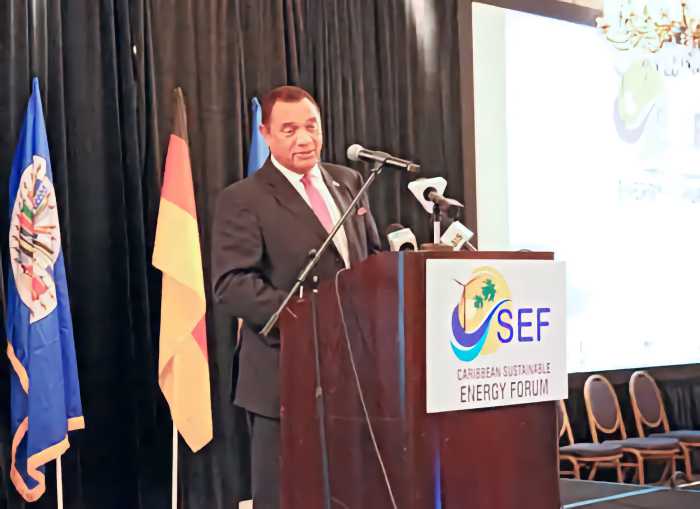As the widow of the assassinated Haitian president hinted that she may contest forthcoming presidential elections, a Haitian American legislator in Brooklyn is calling for “free and fair” presidential elections in the French-speaking Caribbean country.
“Martine Moïse, the wife of Haiti’s assassinated president, Jovenel Moïse, has indicated in interviews that she is seriously considering a run for the presidency. While I cannot predict the future, I do believe the Haitian people deserve a free and fair presidential election, which will be a critical step toward restoring prosperity, stability and the rule of law,” Council Member Farah N. Louis, who is also the president of the National Haitian American Elected Officials Network (NHAEON) New York Chapter, told Caribbean Life on Wednesday.
“The United States should work to help ensure that the Haitian people have the right to decide their own future,” added Louis, the daughter of Haitian immigrants, who represents the 45th Council District in Brooklyn.
In her first interview since her husband’s assassination on July 7, Mrs. Moïse, 47, told the New York Times, on July 30, that she may consider contesting the presidential elections.
“President Jovenel had a vision,” she said, “and we Haitians are not going to let that die.”
The Haitian police have detained a wide array of people in connection with the killing, including 18 Colombians and several Haitians and Haitian Americans, and they are still seeking others, according to the Times.
It said the suspects include retired Colombian commandos, a former judge, a security equipment salesman, a mortgage and insurance broker in Florida, and two commanders of the president’s security team.
Alluding to the Haitian police, the Times said the elaborate plot revolves around a 63-year-old doctor and pastor, Christian Emmanuel Sanon, who officials say conspired to hire the Colombian mercenaries to kill the president and seize political power.
But the critics of the government’s explanation say that none of the people named in the investigation had the means to finance the plot on their own, according to the Times.
“And Mrs. Moïse, like many Haitians, believes there must have been a mastermind behind them, giving the orders and supplying the money,” it said. “She wants to know what happened to the 30 to 50 men who were usually posted at her house whenever her husband was at home.
None of his guards were killed or even wounded, Mrs. Moïse said.
“I don’t understand how nobody was shot,” she said.
At the time of his death, Mr. Moïse, 53, had been in the throes of a political crisis, the Times said.
It said protesters accused the president of overstaying his term, of controlling local gangs and of ruling by decree as the nation’s institutions were being hollowed out.
Mr. Moïse was also locked in battle with some of the nation’s wealthy oligarchs, including the family that controlled the nation’s electrical grid, the Times said.
It said while many people described the president as an autocratic leader, Mrs. Moïse said her fellow citizens should remember him as a man who stood up to the rich and powerful.
“Only the oligarchs and the system could kill him,” she told the Times.
Caribbean American congresswoman Yvette D. Clarke, founding co-chair of the US House of Representatives’ Caribbean and Haiti Caucuses, has led a letter to US President Joseph Biden urging him to “prioritize the needs of Haiti and members of the Haitian Diaspora.”
Clarke – the daughter of Jamaican immigrants, who represents the largely Caribbean 9th Congressional District in Brooklyn — copied the letter to Secretary of State Antony J. Blinken and Secretary of Homeland Security Alejandro N. Mayorkas Mayorkas.
The letter was also signed by House Haiti Caucus co-chairs Congressmembers Andy Levin (MI-09), Val Demings (FL-10), Ayanna Pressley (MA-07), Mondaire Jones (NY-17); House Caribbean Caucus Co-chairs Congressmembers Maxine Waters (NY-17), and Stacy Plaskett (VI-at large); Members of the House Haiti and Caribbean Caucus, Congressmembers Frederica Wilson (FL-24), Adriano Espaillat (NY-13), Sheila Jackson Lee (TX-18), Grace Meng (NY-06), Darren Soto (FL-09), and Debbie Wasserman Schultz (FL-23).
“As founding co-chair of both the House Caribbean and Haiti Caucuses, I have worked closely with my colleagues to insist the administration prioritize the needs of Haiti and members of the Haitian Diaspora that [who] call America home,” wrote Clarke, who is also chair of the Congressional Black Caucus Taskforce on Immigration.
“The signers of this letter come to D.C. with vastly different backgrounds and from all corners of our country,” added the senior member of the House Energy and Commerce Committee, and senior member of the House Committee on Homeland Security. “Yet, we have found common ground in our unwavering commitment to the Haitian people, their wellbeing and an immutable desire to see a thriving Haitian democracy.
“Presently, Haiti is at an inflection point, and we must work together to promote peace and a Haitian-led democratic government,” the letter urged. “This letter outlines our urgent concerns and shares our collective caucus priorities regarding Haiti’s continued deteriorating situation.”
The letter was dispatched as a number of Haitian American legislators and groups in New York last week called on the Biden administration to “create an easier pathway” for Haitians seeking political asylum.
In their letter, the elected officials, including New York State Assemblymember Rodneyse Bichotte Hermelyn, chair of the Brooklyn Democratic Party, urged the administration to create this “easier pathway” by lifting the refugee admission ceiling, temporarily halting the deportation of Haitian migrants from the US, and providing the people of Haiti with humanitarian aid in the form of food assistance and additional COVID-19 vaccine doses.
“There is a crisis in Haiti that demands our immediate attention as Americans, and begs the continued action of your leadership,” said the letter, which was also signed by New York State Assemblymembers Michaelle Solages and Kimberly Jean-Pierre; New York City Council Member Farah N. Louis; and Democratic Party nominees for New York City Council Rita Joseph and Chi Osse.
Haitian groups and advocates in New York who signed the letter included Little Haiti BK, Inc.; Life of Hope Church; HABNET Chamber of Commerce; FS Nostrand Merchant Association; Haitian American Business Network; Haitian American Caucus; Haitian Americans United for Progress; CUNY (City University of New York) Haitian Studies Institute at Brooklyn College; Haiti Cultural Exchange; and Haitian American Nurses Association.
A group of over 200 current and former Haitian American elected officials has also written to the Biden administration, requesting an “urgent” meeting to discuss US policy toward Haiti in the wake of the July 7 assassination of Haitian President Jovenel Moïse.
The Washington-based NHAEON, considered the largest network of Haitian-American elected and appointed officials in the US, has dispatched a letter to Blinken.
“We have been working to build a relationship with the Biden administration vis-a-vis its foreign policy towards Haiti,” said the letter, signed by NHAEON Chairperson Alix Desulme, a council member in North Miami, Fl.
“While we are pleased with President Biden’s extension of TPS (Temporary Protected Status), we grow weary and frustrated with the lack of communication of the ongoing instability in Haiti,” the letter added. “We are ready to work with you to add value to the trajectory of US foreign policy towards Haiti.”
NHAEON said its members represent millions of constituents across the United States but primarily in Florida, New York and New Jersey.
The Biden administration has reiterated its commitment to supporting the Haitian people following the heinous assassination of President Moïse.
US Department of State spokesman Ned Price said US Secretary of State Antony J. Blinken reiterated the pledge in a telephone call with new Haitian Prime Minister, Dr. Ariel Henry.
“The secretary also underscored the need for Prime Minister Henry’s unity government to seek broad political and civil society consensus on government priorities,” Price said.
“Secretary Blinken, echoing the international community, emphasized the importance of establishing the conditions necessary for Haitians to vote in free and fair legislative and presidential elections as soon as feasible,” he added.
The US welcomed efforts by Haiti’s political leadership to come together in choosing an interim prime minister and a unity cabinet to chart a path forward.
“The formation of this interim government is a positive and necessary step to respond to the Haitian people’s needs and begin restoring Haiti’s democratic institutions,” Blinken said.
“The United States, together with the international community, urges Haiti’s political and civil society leaders to continue to work together to advance a broad and inclusive dialogue that responds to the needs of the Haitian people, and lays the groundwork for long-term stability and prosperity,” he added.





















